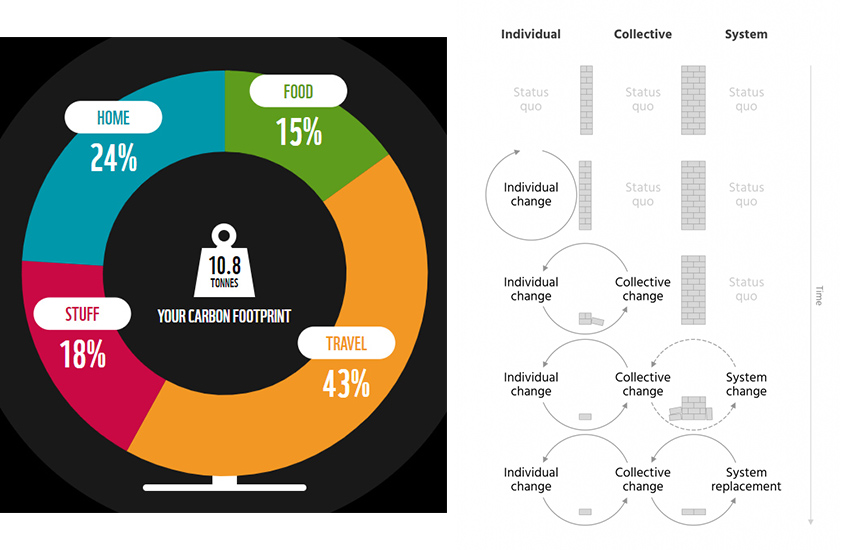Instances of the ripple effect of collective opinion can be seen throughout history; for example, have you ever wondered why it is Americans don’t drink tea? The Tea Act imposed on the American colonies by Britain in 1773 led directly to individuals acting collectively. Americans decided unanimously that they would not supplement the failing fortunes of the East India Company, for whom the act had been created. Instead, almost to a man, the Americans switched to the less popular beverage, coffee, which, unlike tea, was not subject to British tax. This remains an example of mass action neutering a poor piece of legislation; whilst the ripple effect over the generations has seen a complete change in the actual tastes of a whole nation. Even to this day you will struggle to get a decent cupper in America, as they’ve lost the taste for it.
 Individuals unite to fight the Tea Act – America 1773
It has been a slow, frustrating path towards general acceptance that we are heading towards a catastrophic climate crisis. Whilst solutions as to how to successfully turn around the behaviours of an entire population remain very much on the horizon. As a species, we must reduce our individual carbon footprint to 2.5 tonnes per year by 2030. With over 7,699,99,99 of us on the planet, how to achieve this herculean task is the biggest question we have ever had to face.
Interactive carbon consumption graph - 'Source: OWID based on CDIAC; Global Caron Project; Gapminder & UN
According to Professor Peter Singer of Princeton University, described as “the world’s most influential living philosopher” by New Yorker magazine: “I think this is one of the great moral challenges of the 21st Century, perhaps the greatest moral challenge”…. “If we are not acting, we are endangering everyone who is alive now and also future generations.” …. “The fact that the cause is invisible gases, and that the effect may be felt in the distant future, doesn’t allow each and every one of us to escape the moral obligation to act.”
Individuals unite to fight the Tea Act – America 1773
It has been a slow, frustrating path towards general acceptance that we are heading towards a catastrophic climate crisis. Whilst solutions as to how to successfully turn around the behaviours of an entire population remain very much on the horizon. As a species, we must reduce our individual carbon footprint to 2.5 tonnes per year by 2030. With over 7,699,99,99 of us on the planet, how to achieve this herculean task is the biggest question we have ever had to face.
Interactive carbon consumption graph - 'Source: OWID based on CDIAC; Global Caron Project; Gapminder & UN
According to Professor Peter Singer of Princeton University, described as “the world’s most influential living philosopher” by New Yorker magazine: “I think this is one of the great moral challenges of the 21st Century, perhaps the greatest moral challenge”…. “If we are not acting, we are endangering everyone who is alive now and also future generations.” …. “The fact that the cause is invisible gases, and that the effect may be felt in the distant future, doesn’t allow each and every one of us to escape the moral obligation to act.”
 Greta on strike in Katowice, Poland/ ABRICE COFFRINI/Getty Images
One of the central myths perpetuated by FUD (Fear, Uncertainty and Doubt) systems is that the debate is between individual change or system change which deliberately fudges the argument. Climate activists are consistently clear that they are not advocating individual change in a vacuum, but instead that individuals should question both their behaviour and existing systems. Whether we require systemic change or replacement is up for debate.
Living a 2.5-tonne lifestyle requires each individual to measure each and every choice they make against the effect it will make on their carbon footprint. Choices such as where to live, where to work and what to consume will ultimately need to be weighed against their actual environmental impact. When the ripple effect of the 2.5-tonne lifestyle has gathered sufficient momentum the resulting collective will have sufficient power to effect systemic change. Existing systems will need to adapt to accommodate this collection of determined individuals: As an industry thought leader Guy Grainger succinctly put it “This is the real world. Adjust your business model, even if it costs more money. If you do not, be prepared to die, along with the dinosaurs.”
Greta on strike in Katowice, Poland/ ABRICE COFFRINI/Getty Images
One of the central myths perpetuated by FUD (Fear, Uncertainty and Doubt) systems is that the debate is between individual change or system change which deliberately fudges the argument. Climate activists are consistently clear that they are not advocating individual change in a vacuum, but instead that individuals should question both their behaviour and existing systems. Whether we require systemic change or replacement is up for debate.
Living a 2.5-tonne lifestyle requires each individual to measure each and every choice they make against the effect it will make on their carbon footprint. Choices such as where to live, where to work and what to consume will ultimately need to be weighed against their actual environmental impact. When the ripple effect of the 2.5-tonne lifestyle has gathered sufficient momentum the resulting collective will have sufficient power to effect systemic change. Existing systems will need to adapt to accommodate this collection of determined individuals: As an industry thought leader Guy Grainger succinctly put it “This is the real world. Adjust your business model, even if it costs more money. If you do not, be prepared to die, along with the dinosaurs.”
 Individual carbon footprint – Systemic change resulting from collection of individuals
Although the decisions are more complex than whether to drink coffee or tea the ripple effect of collective individual actions remains the same. As our understanding deepens significant sections of humanity now influenced by Greta will actively pursue 2.5-tonne lifestyles. To do this they will demand ever more clarity and transparency of information to inform their decisions.
Climate activists are creating the ripples which leaders of current-day systems ignore at their own peril!
Individual carbon footprint – Systemic change resulting from collection of individuals
Although the decisions are more complex than whether to drink coffee or tea the ripple effect of collective individual actions remains the same. As our understanding deepens significant sections of humanity now influenced by Greta will actively pursue 2.5-tonne lifestyles. To do this they will demand ever more clarity and transparency of information to inform their decisions.
Climate activists are creating the ripples which leaders of current-day systems ignore at their own peril!
 Individuals unite to fight the Tea Act – America 1773
It has been a slow, frustrating path towards general acceptance that we are heading towards a catastrophic climate crisis. Whilst solutions as to how to successfully turn around the behaviours of an entire population remain very much on the horizon. As a species, we must reduce our individual carbon footprint to 2.5 tonnes per year by 2030. With over 7,699,99,99 of us on the planet, how to achieve this herculean task is the biggest question we have ever had to face.
Interactive carbon consumption graph - 'Source: OWID based on CDIAC; Global Caron Project; Gapminder & UN
According to Professor Peter Singer of Princeton University, described as “the world’s most influential living philosopher” by New Yorker magazine: “I think this is one of the great moral challenges of the 21st Century, perhaps the greatest moral challenge”…. “If we are not acting, we are endangering everyone who is alive now and also future generations.” …. “The fact that the cause is invisible gases, and that the effect may be felt in the distant future, doesn’t allow each and every one of us to escape the moral obligation to act.”
Individuals unite to fight the Tea Act – America 1773
It has been a slow, frustrating path towards general acceptance that we are heading towards a catastrophic climate crisis. Whilst solutions as to how to successfully turn around the behaviours of an entire population remain very much on the horizon. As a species, we must reduce our individual carbon footprint to 2.5 tonnes per year by 2030. With over 7,699,99,99 of us on the planet, how to achieve this herculean task is the biggest question we have ever had to face.
Interactive carbon consumption graph - 'Source: OWID based on CDIAC; Global Caron Project; Gapminder & UN
According to Professor Peter Singer of Princeton University, described as “the world’s most influential living philosopher” by New Yorker magazine: “I think this is one of the great moral challenges of the 21st Century, perhaps the greatest moral challenge”…. “If we are not acting, we are endangering everyone who is alive now and also future generations.” …. “The fact that the cause is invisible gases, and that the effect may be felt in the distant future, doesn’t allow each and every one of us to escape the moral obligation to act.”
 Greta on strike in Katowice, Poland/ ABRICE COFFRINI/Getty Images
One of the central myths perpetuated by FUD (Fear, Uncertainty and Doubt) systems is that the debate is between individual change or system change which deliberately fudges the argument. Climate activists are consistently clear that they are not advocating individual change in a vacuum, but instead that individuals should question both their behaviour and existing systems. Whether we require systemic change or replacement is up for debate.
Living a 2.5-tonne lifestyle requires each individual to measure each and every choice they make against the effect it will make on their carbon footprint. Choices such as where to live, where to work and what to consume will ultimately need to be weighed against their actual environmental impact. When the ripple effect of the 2.5-tonne lifestyle has gathered sufficient momentum the resulting collective will have sufficient power to effect systemic change. Existing systems will need to adapt to accommodate this collection of determined individuals: As an industry thought leader Guy Grainger succinctly put it “This is the real world. Adjust your business model, even if it costs more money. If you do not, be prepared to die, along with the dinosaurs.”
Greta on strike in Katowice, Poland/ ABRICE COFFRINI/Getty Images
One of the central myths perpetuated by FUD (Fear, Uncertainty and Doubt) systems is that the debate is between individual change or system change which deliberately fudges the argument. Climate activists are consistently clear that they are not advocating individual change in a vacuum, but instead that individuals should question both their behaviour and existing systems. Whether we require systemic change or replacement is up for debate.
Living a 2.5-tonne lifestyle requires each individual to measure each and every choice they make against the effect it will make on their carbon footprint. Choices such as where to live, where to work and what to consume will ultimately need to be weighed against their actual environmental impact. When the ripple effect of the 2.5-tonne lifestyle has gathered sufficient momentum the resulting collective will have sufficient power to effect systemic change. Existing systems will need to adapt to accommodate this collection of determined individuals: As an industry thought leader Guy Grainger succinctly put it “This is the real world. Adjust your business model, even if it costs more money. If you do not, be prepared to die, along with the dinosaurs.”
 Individual carbon footprint – Systemic change resulting from collection of individuals
Although the decisions are more complex than whether to drink coffee or tea the ripple effect of collective individual actions remains the same. As our understanding deepens significant sections of humanity now influenced by Greta will actively pursue 2.5-tonne lifestyles. To do this they will demand ever more clarity and transparency of information to inform their decisions.
Climate activists are creating the ripples which leaders of current-day systems ignore at their own peril!
Individual carbon footprint – Systemic change resulting from collection of individuals
Although the decisions are more complex than whether to drink coffee or tea the ripple effect of collective individual actions remains the same. As our understanding deepens significant sections of humanity now influenced by Greta will actively pursue 2.5-tonne lifestyles. To do this they will demand ever more clarity and transparency of information to inform their decisions.
Climate activists are creating the ripples which leaders of current-day systems ignore at their own peril!- Date
- Category
- The Built Environment